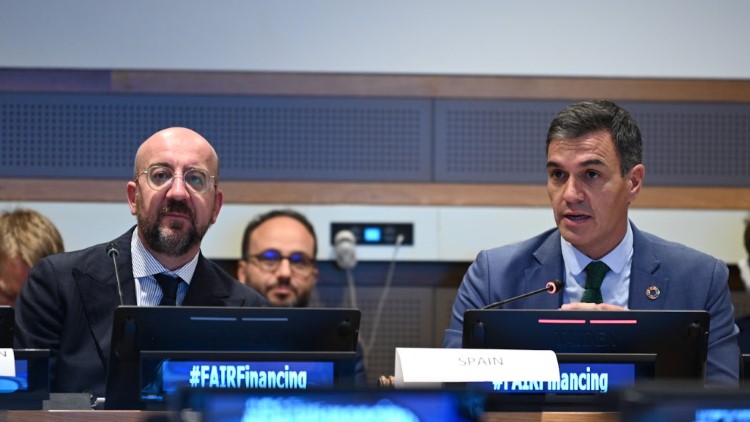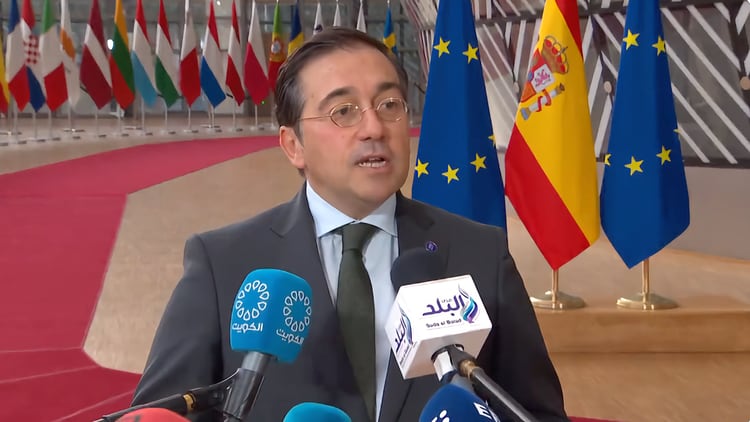Eduardo González
The acting President of the Government, Pedro Sánchez, warned yesterday at the UN headquarters in New York of the need to reform the multilateral development banks, as well as to increase their financing capacity and to carry out actions that address the debt crisis, in order to benefit the “most vulnerable, including middle-income countries”.
“It is crucial and urgent to reform the multilateral development banks,” said Sánchez during his speech at the high-level roundtable Towards a fair international financial architecture, co-organized by the Government of Spain and the President of the European Council, Charles Michel, to address the reform of the international financial architecture.
The event, organized at the United Nations headquarters as part of the UN High-Level Week and the start of the 78th session of the UN General Assembly, brought together heads of state and government from Argentina, Bangladesh, Cape Verde, Ghana, Rwanda, Senegal, and other representatives from France, Costa Rica, the United Arab Emirates and Chile. The managing director of the IMF and the presidents of the European Investment Bank and the African Development Bank also participated, along with other senior officials from the World Bank, the CAF, the Inter-American Development Bank and the United Nations.
In Sánchez’s opinion, it is necessary to “substantially” increase the lending capacity of multilateral development banks, as well as to promote concessional lending and the implementation of emergency windows, in order to “improve the capacity of multilateral development banks to address global challenges and the needs of the most vulnerable, including middle-income countries”.
Secondly, Pedro Sánchez highlighted the need to “explore innovative tools and approaches to channel more resources and enhance the power of multilateral development banks, including through blended, hybrid capital or guarantees”, optimizing, to this end, the use of the Special Drawing Rights (SDRs) received in 2021, “which has allowed us to mobilize $100 billion”. “Spain has contributed to both the Poverty Reduction and Growth Trust Fund and the Resilience and Sustainability Trust Fund, in line with its SDR rechanneling commitments, but we are ready to explore other options,” he continued.
Thirdly, the acting head of the Executive called for “bold measures to address the current debt crisis affecting dozens of countries” and for restructuring processes to be carried out more quickly, and for middle-income countries to be included. In this regard, Pedro Sánchez stressed that debt-for-climate swaps and debt standstill clauses for natural and climate disasters can also be useful tools for the governments of the countries most vulnerable to the impacts of climate change.
Sánchez also stressed the central role that the United Nations should play in the process of improving the international financial architecture and reiterated Spain’s willingness to host the Fourth International Conference on Financing for Development in 2025.
For his part, the President of the European Council, Charles Michel, stated that the “current global financial architecture is like an old house, built in another time, for another moment, and this house has served us well for decades”, but “it is time to make this house strong and resistant again, to protect its inhabitants and satisfy their needs”.
According to Michel, “we need to make sure that everyone has fair access to finance, and for this to happen, the multilateral development banks (MDBs) must be reformed and there must be better, faster and more effective access to finance.” “This will enable us to address global challenges such as climate change, biodiversity, pandemics and poverty,” he added.
The round table on the reform of the international financial system was the most important event of Pedro Sánchez’s second day at the UN High-Level Week, which included the start of the General Assembly, in which the UN Secretary General, António Guterres, the President of Brazil (as is tradition), Luiz Inácio Lula da Silva, and the President of the United States, Joe Biden, spoke as the host country. This was followed by the speeches of the Heads of State and Government. Pedro Sánchez’s speech will take place today and will conclude his participation in the High-Level Week.
Bilateral: Mauritania, Iraq and Western Sahara
In addition, Sánchez held bilateral meetings yesterday with the President of Mauritania, Mohamed Ould Ghazouni, and with the Prime Minister of Iraq, Mohamed Shia al Sudani (six months after Spain assumed command of NATO operations in Iraq), with whom he highlighted “the solid bilateral relations and Spain’s cooperation work in both countries”, as reported by Moncloa on its official account on the social network X, formerly Twitter.
The previous day, the acting Prime Minister discussed with Antonio Guterres, the issue of Western Sahara, according to government sources reported to the Europa Press agency. During the meeting, the secretary general informed Sanchez about the recent tour of his special envoy for Western Sahara, Staffan de Mistura (the third since he was appointed in November 2021), in which he held meetings with Morocco, the Polisario Front, Algeria and Mauritania, and Pedro Sanchez expressed Spain’s support for de Mistura’s efforts to try to find a solution to the conflict in the former Spanish colony. The special envoy is due to present his report on the situation in Western Sahara in mid-October to the UN Security Council.






